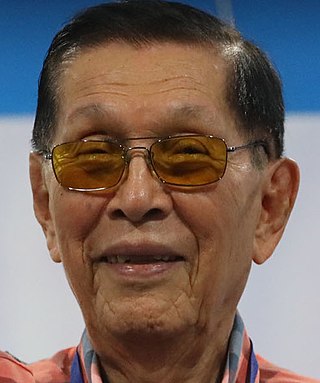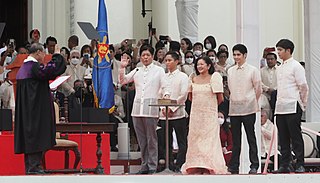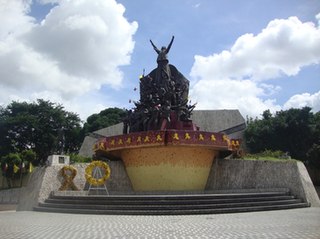See also
- EDSA (disambiguation)
- EDSA Revolution of 2001, index of revolutions in that year
EDSA Revolution or the People Power Revolution is the 1986 event in the Philippines that toppled President Ferdinand Marcos Sr. after alleged cheating in the 1986 Philippine presidential election.
EDSA Revolution may also refer to:

The People Power Revolution, also known as the EDSA Revolution or the February Revolution, was a series of popular demonstrations in the Philippines, mostly in Metro Manila, from February 22 to 25, 1986. There was a sustained campaign of civil resistance against regime violence and electoral fraud. The nonviolent revolution led to the departure of Ferdinand Marcos, the end of his 20-year dictatorship and the restoration of democracy in the Philippines.

Epifanio de los Santos Avenue, commonly referred to by its acronym EDSA, is a limited-access circumferential highway around Manila, the capital city of the Philippines. It passes through 6 of Metro Manila's 17 local government units or cities, namely, from north to south, Caloocan, Quezon City, San Juan, Mandaluyong, Makati, and Pasay.

The Shrine of Mary, Queen of Peace, Our Lady of EDSA, or more popularly, the EDSA Shrine is a small church of the Roman Catholic Archdiocese of Manila located at the intersection of Ortigas Avenue and Epifanio de los Santos Avenue (EDSA) in Barangay Ugong Norte, Quezon City. The church is also called the Archdiocesan Shrine of Mary, Queen of Peace or Mary, Queen of Peace Quasi-Parish, although these names are seldom used. It is also a declared Important Cultural Property by the National Commission for Culture and the Arts.

The Pwersa ng Masang Pilipino, formerly Partido ng Masang Pilipino, is a populist political party in the Philippines. It is the political party of former Philippine President Joseph E. Estrada. In the May 1998 presidential election, it aligned itself with other political parties to form the Laban ng Makabayang Masang Pilipino.

Jaime Lachica Sin, commonly and formally known as Jaime Cardinal Sin, was the 30th Roman Catholic Archbishop of Manila and the third cardinal from the Philippines. He was instrumental in the historic and peaceful 1986 People Power Revolution, which toppled the dictatorship and ended martial law under Ferdinand Marcos and installed Corazon Aquino as his successor in the Fifth Republic of the Philippines. He was also a key figure in the 2001 EDSA Revolution that replaced President Joseph Estrada with Gloria Macapagal Arroyo.

The Second EDSA Revolution, also known as the Second People Power Revolution, EDSA 2001, or EDSA II, was a political protest from January 17–20, 2001 which peacefully overthrew the government of Joseph Estrada, the thirteenth president of the Philippines. Following allegations of corruption against Estrada and his subsequent investigation by Congress, impeachment proceedings against the president were opened on January 16. The decision by several senators not to examine a letter which would purportedly prove Estrada's guilt sparked large protests at the EDSA Shrine in Metro Manila, and calls for Estrada's resignation intensified in the following days, with the Armed Forces withdrawing their support for the president on January 19. On January 20 Estrada resigned and fled Malacañang Palace with his family. He was succeeded by Vice President Gloria Macapagal Arroyo, who had been sworn into the presidency by Chief Justice Hilario Davide Jr. several hours earlier.
Renato "Rene" Salud de Villa is a Filipino former police and military officer and government official. He served as Chief of Philippine Constabulary, Director-General of the Integrated National Police, and Chief of Staff of the Armed Forces of the Philippines. He then served as Secretary of National Defense under presidents Corazon Aquino and Fidel V. Ramos. He founded Partido para sa Demokratikong Reporma for his unsuccessful presidential bid in 1998. He then briefly served as Executive Secretary under President Gloria Macapagal Arroyo.

The May 1 riots, or EDSA III, were protests sparked by the arrest of newly deposed president Joseph Estrada of the Philippines from April 25 to May 1, 2001. The protest was held for seven days on a major highway in Metro Manila, Epifanio de los Santos Avenue (EDSA), which eventually culminated in an attempt to storm Malacañang.

Juan Valentin Furagganan Ponce Enrile Sr.,, also referred to by his initials JPE, is a Filipino politician and lawyer known for his role in the administration of Philippine president Ferdinand Marcos; his role in the failed coup that helped hasten the 1986 People Power Revolution and the ouster of Marcos; and his tenure in the Philippine legislature in the years after the revolution. Enrile has served four terms in the Senate, in a total of twenty-two years, he holds the third longest-tenure in the history of the upper chamber. In 2022, at the age of 98, he returned to government office as the Chief Presidential Legal Counsel in the administration of President Bongbong Marcos.

Gregorio "Gringo" Ballesteros Honasan II, is a Filipino politician and a cashiered Philippine Army officer who led unsuccessful coups d'état against President Corazon Aquino. He played a key role in the 1986 EDSA Revolution that toppled President Ferdinand Marcos.

The inauguration of the president of the Republic of the Philippines is a ceremony marking the commencement of the six-year term of a president of the Philippines, who is both head of state and head of government. The inauguration is performed on June 30, as mandated by the 1987 Constitution. Under the older 1935 Constitution, the date was December 30, which is also Rizal Day; the last inauguration held on the older date was Ferdinand Marcos' second one on December 30, 1969. The most recent public presidential inauguration ceremony was that of President Bongbong Marcos, who began his six-year term in office on Thursday, June 30, 2022.

The city mayor of Manila is the head of the executive branch of Manila's city government. The mayor holds office at Manila City Hall. Like all local government heads in the Philippines, the mayor is elected via popular vote, and may not be elected for a fourth consecutive term. In case of death, resignation or incapacity, the vice mayor becomes the mayor.

The presidency of Joseph Estrada, also known as the Estrada administration, spanned 31 months from June 30, 1998, to January 20, 2001. Estrada was elected president of the Philippines in the May 11, 1998 national elections, receiving almost 11 million votes.
Ricardo Wright Herrero, better known by his stage name Subas Herrero, was a Filipino actor, comedian and singer.

Teofisto "Tito" Tayko Guingona Jr. is a Filipino politician and diplomat who served as the 11th Vice President of the Philippines from 2001 to 2004, during the first term of President Gloria Macapagal Arroyo. Born in San Juan, Rizal, Teofisto is a graduate of Ateneo de Manila University, where he was a working student.

The People Power Monument is an 18 m (59 ft)-high monument built to commemorate the events of the 1986 People Power Revolution. The monument is located on the corner of Epifanio de los Santos Avenue and White Plains Avenue in Barangay Camp Aguinaldo, Quezon City, Philippines. It was made by Eduardo Castrillo in 1993. It is about 0.90 kilometers (0.56 mi) from the EDSA Shrine, another monument built to commemorate the event.
EDSA Revolution of 2001 refers to either of two consecutive events relating to a change of power in the Philippines over the course of the first four months of 2001.
The inauguration of Joseph Estrada as the thirteenth president of the Philippines took place on Tuesday, June 30, 1998, at the Barasoain Church in Malolos, Bulacan. The oath of office was administered by Chief Justice of the Supreme Court of the Philippines Andres Narvasa. Afterwards, Estrada delivered his inaugural speech at the Quirino Grandstand in Manila. The inauguration was held during the Centennial of Philippine Independence. The Inauguration was organized jointly by the Presidential Transition Cooperation Team of outgoing President Fidel V. Ramos and the Transition Team of incoming President Estrada. This was the last presidential oath administered by Narvasa.

The first inauguration of Gloria Macapagal Arroyo as the fourteenth president of the Philippines occurred on Saturday, January 20, 2001, on the fourth day of the Second People Power Revolution following the removal of President Joseph Estrada. The fourth non-scheduled extraordinary inauguration and the first presidential inauguration to take place in the 21st century marked the commencement of the first term of Gloria Macapagal Arroyo as President. Chief Justice Hilario Davide, Jr. administered the oath of office. Although this is the fourth non-scheduled inauguration, this was the first non-scheduled extraordinary presidential inauguration upon the removal of a president since the first three inaugurations took place upon the death of former presidents.
EDSA stands for "Epifanio de los Santos Avenue", a highway around Metro Manila, Philippines.